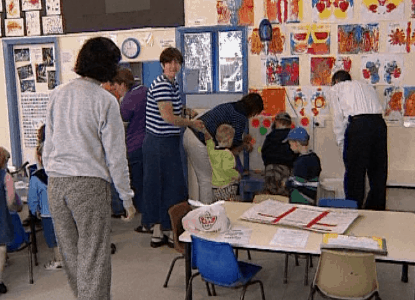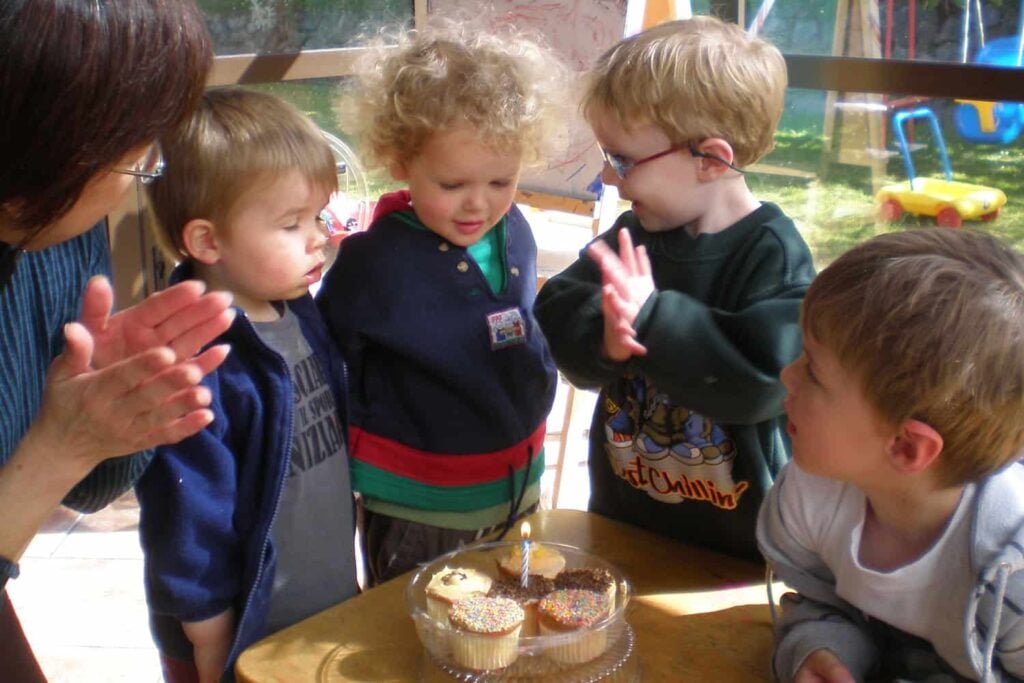An OECD report “Quality matters in Early Childhood Education and Care: United Kingdom (England)” explains that ECE can be a lot better for children if it engages with parents, families, and others in communities.
This article provides a summary of the main points.
What Matters Most for Positive Learning Outcomes from ECE for Children
The aspects that matter most are:
1. The quality of the home learning environment, parent’s interactions with their child, and knowledge of child development
In the early childhood years the most effective approach to boost children’s later achievement is support for parents to actively engage in children’s learning at home.
It follows then that research has also shown that ECE services that directly promote activities for children and parents to do together are most beneficial for children’s development.
“There are several ways in which ECEC services can help enhance the HLE, including providing activities and materials for parents and children to do together, offering parents tips on reading aloud to children and offering literacy learning kits. ECEC staff can also encourage parental engagement in early learning by providing them with resources and activities that further the work that is being addressed within the classroom. (p. 31)”
Early childhood education services can and should effectively support low-income families, dysfunctional families and parents with a limited education to realise a successful curriculum at home.
“Parents can involve children in daily routines (e.g., meals, phone calls, making grocery lists, getting dressed), enrich these routines with stimulating discussions, and trigger their children’s curiosity and exploration urges. This kind of “home curriculum” boosts children’s language development, cognitive development and academic achievement (p.31)”
“The Manukau Family Literacy Programme (MFLP) in New Zealand offers learning opportunities to parents of children in ECEC. The MFLP is targeted at low-decile communities. Enrolment is sought from family members in the child’s household who have low or no educational qualifications. The programme is delivered over the regular early childhood centre week using an integrated approach consisting of 20 hours per week for the parent. It has four components: 1) an adult education component designed to extend basic education skills of participants and help them acquire successful interpersonal skills; 2) children’s education to promote growth and development of young children and engage parents in their child’s learning; 3) exercising Parent and Child Together Time involving shared learning experiences between child and parent; and 4) parent learning of parenting skills and other family and parenting issues.” (p. 71)
A popular form of parental engagement – reading to children has been found to be highly beneficial for children. Parents can be trained to participate in book reading and taught to read to children from a young age.
In New Zealand, the Early Reading Together initiative has been implemented. It is a programme which helps parents of young children (infants to six-year-olds) to support their children’s language and literacy development at home and is specifically designed to support children and parents from diverse language/literacy, cultural, educational and socio-economic backgrounds. It is implemented on a voluntary basis by junior school teachers, early childhood educators and librarians and includes three workshops of one hour and fifteen minutes each, spread over three weeks: the time commitment is low. Its results include increased competence of parents on assisting their children at home with reading.” (p. 71)
2. Strategic partnerships between early childhood services and parents, involving frequent communication, shared goals, recognition of parental aspirations, and home-visits by ECE staff.
3. Strategic partnerships between early childhood services and communities, involving tapping into community resources such as libraries, tailored services and flexibility for harder-to-reach families, and targeting certain neighbourhood conditions to assist the children and families affected e.g. by substance abuse.
4. Staff who are trained and know and can implement a variety of approaches for parent, family and community engagement.
The Challenges of Engaging with Families and Communities
The OECD report states that the common challenges countries face in engaging families and communities are:
- lack of awareness and motivation
- communication and outreach
- time constraints
- increasing inequity, and
- co-operation with other services and levels of education.
It states that England has attempted to address these challenges by, for example, revising entitlement to free hours of ECE to better meet parental needs. It further recommends that England:
- involves parents more in curriculum development
- trains educators specifically on communication and co-operation with community services
- sets flexible times for contact hours between staff and parents
- develops specialised parenting home programmes, and
- bridges the gaps between ECE provisions and different community services.
ENDS.









